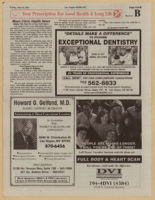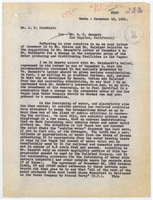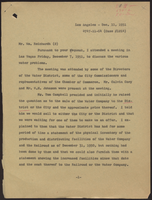Search the Special Collections and Archives Portal
Search Results

Transcript of interview with Ralph Denton by K.J. Evans, approximately 1999-2000
Date
Archival Collection
Description
On an unknown date (likely 1999-2000) and time, K.J. Evans interviewed Ralph Denton, an adviser to former Governor Grant Sawyer and political figure in Nevada for many years. Denton first talks about his personal friendship with Sawyer, their education in law school, and his eventual work on campaigning for and working with Sawyer after he became governor. Denton then explains the controversy regarding Denton’s accepting of complimentary services (comps) at hotels. He later describes his work as a Clark County Commissioner and then talks about working as district attorney in Esmeralda County, Nevada. Denton then talks about the influences that led him to be interested in a career of law and later speaks more about working with Grant Sawyer, specifically about serving as his adviser, afterwards providing the argument on why he believes Sawyer was the greatest governor of Nevada. Toward the latter part of the interview, Denton describes his work on improving civil rights and some of the challenges that came with that. The two also discuss how the practice of law has changed over time. To conclude the interview, Denton describes his experience in running for governor and how he would have served as governor if he had been elected.
Text

Transcript of interview with Michael S. Mack by Barbara Tabach, May 20, 2015
Date
Archival Collection
Description
In this oral history Michael Mack discusses his early memories of Las Vegas such as attending the Fifth Street School and activities him and his friends participated in. The interview also includes his memories of different members of the Mack family and their activities. He reminisces about his many visits to the Flamingo Hotel as well as being taken by his parent to floor shows. He also discusses what it was like to grow up Jewish in Las Vegas and the way Jews helped build the community.
Text

Las Vegas Israelite newspaper, Section B, June 22, 2001
Date
Description
Issue of the Las Vegas Israelite newspaper.
Text
Arthur G. Grant Photograph Collection
Identifier
Abstract
Arthur G. Grant Photograph Collection (approximately 1950-1965) consists of 120mm and 35mm color photographic slides taken in the mid-1950s in and around Las Vegas, Nevada. Images depict Arthur G. Grant's home life, the Fortune Club business on Fremont Street, general downtown, Helldorado Parade, and a Mount Charleston picnic. The collection also contains images of Lake Mead boat races including an appearance by Donald Campbell and his water speed world record-setting jet powered boat, Bluebird.
Archival Collection
Station Casinos Menu Collection
Identifier
Abstract
The Station Casinos Menu collection is comprised of digital food and beverage menus (approximately 2016) from hotel casino restaurants owned by the Station Casinos gaming company in Las Vegas, Nevada. Digital menus are from restaurants within Green Valley Ranch Resort Spa & Casino and a digitized Food Express Chinese Restaurant menu from Palace Station Hotel & Casino.
Archival Collection
H. E. and Ruth Hazard Political Papers
Identifier
Abstract
The H. E. and Ruth Hazard Political Papers (1937-1977) consist of papers and memorabilia related to Nevada and national Democratic politics. It includes materials about the Nevada legislature; clippings and information about the Nevada Tax Commission; political memorabilia including invitations and programs related to the presidential inaugurations of Lyndon Johnson and Jimmy Carter; documents about the purchase of Basic Magnesium Inc. by the state of Nevada; and newspaper clippings.
Archival Collection
Station Casinos Publicity Collection
Identifier
Abstract
The Station Casinos Publicity Collection (1995-2013) contains magazine articles, newsclippings, and photographs about various Station Casinos properties in Las Vegas, Nevada. A transition report published by Station Casinos in 1998 is also included.
Archival Collection

Letter from W. R. Rouse (Omaha) to A. E. Stoddard, December 18, 1951
Date
Archival Collection
Description
Suggestions that the Railroad should develop its own water so that it will not be subject to rationing as experienced by other water districts. Dividing the water production from all other assets of the Las Vegas Land and Water Company may be the best option for the Railroad to protect its water rights.
Text

Letter from E. E. Bennett (Los Angeles) to William Reinhardt, December 11, 1951
Date
Archival Collection
Description
The Las Vegas Land and Water Company provided the water district with an inventory a year before, but no buyers made an offer yet. The letter is an account of a meeting to discuss further details of the proposed purchase. "8011-- 174-2 80-Gen." written in red pencil at head of the letter.
Text
